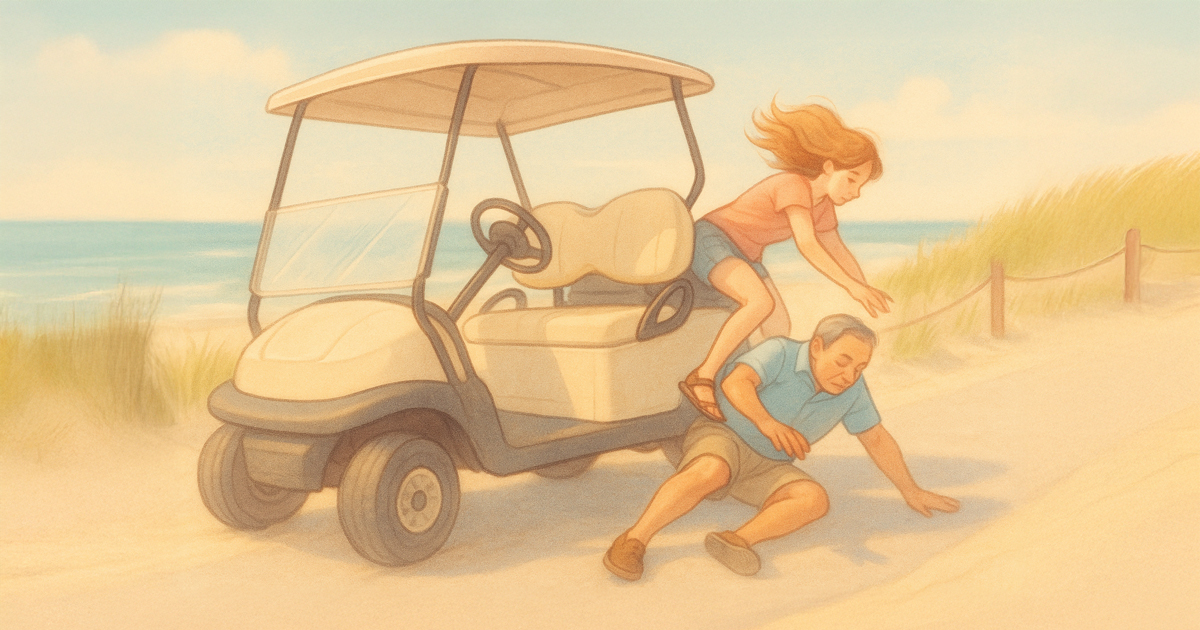At The Floyd Law Firm, our attorneys have seen firsthand how quickly a golf cart ride can turn tragic. What’s often viewed as a safe and leisurely way to travel around neighborhoods, resorts, and golf communities can lead to severe injuries when safety laws are ignored or vehicles are improperly operated. As golf cart use continues to grow across South Carolina, so does the number of accidents involving both adults and children. Knowing the state’s golf cart regulations—and your legal rights in the event of an accident—can help keep you and your loved ones safe.
Across the United States, golf cart accidents lead to over 15,000 emergency room visits each year and an estimated 600 deaths annually, according to national safety studies. Alarmingly, nearly 40% of those injured are under the age of 16, and children often sustain severe head injuries after being ejected from the cart.
Common causes of golf cart accidents include:
- Rollovers from sharp turns or excessive speed
- Falls or ejections from open sides of carts
- Distracted or impaired driving
- Operating on prohibited or high-speed roads
Because most golf carts lack seat belts, doors, and other protective features found in standard vehicles, even a minor crash or fall can result in serious injury. Fractures, concussions, and soft tissue injuries are among the most frequent outcomes.
South Carolina’s Golf Cart Laws
To improve safety, South Carolina law sets out clear rules for the registration and operation of golf carts on public roads.
Driver and Registration Requirements
Driver: Must be at least 16 years old and possess a valid driver’s license.
Registration: The golf cart must be registered with the SCDMV and carry proof of registration and liability insurance at all times.
Permit: A golf cart permit is required, and the decal must be displayed on the cart.
To receive a permit, owners must complete SCDMV Form GC-2, provide proof of insurance and a valid driver’s license, and pay a $5 fee.
Operational Restrictions
Roads: Golf carts may only be driven on secondary roads with a posted speed limit of 35 mph or less.
Distance: Operation is limited to within 4 miles of the registered address (or within 4 miles of a gated community entrance).
Time: Carts may be operated only during daylight hours, unless local ordinances provide otherwise.
Highways: Carts may cross highways with higher speed limits only at intersections.
Restrictions: Golf carts may not be used as taxis or for commercial transport.
Surfside Beach Ordinance
In August 2025, the Surfside Beach Town Council approved updated golf cart regulations, allowing golf carts to be driven year-round as long as they are equipped with headlights and taillights. The change removes the previous seasonal time restrictions, though carts may not be operated between 30 minutes after sunset and 30 minutes before sunrise unless properly equipped.
According to Interim Police Chief William Mickle, local enforcement remains strict, with 80 citations and 11 accidents recorded in the previous year. Mickle urged drivers to remain vigilant and follow all safety and registration laws, emphasizing that expanded operating hours do not mean reduced oversight.
Statewide in 2025, children under 12 years old must wear a fastened seat belt when riding on public roads. This new regulation aims to reduce the high number of child injuries resulting from ejections and rollovers.
Who Is Most at Risk?
Certain groups are disproportionately affected by golf cart accidents:
- Children: Account for roughly 40% of injuries, often from head trauma caused by ejection.
- Older adults: Frequently injured in retirement or resort communities, sometimes due to slower reaction times or vehicle instability.
Common Types of Golf Cart Accidents
- Collisions caused by failure to yield or backing up
- Intoxicated driving
- Falls or ejections of passengers
- Pedestrian impacts
- Being rear-ended or sideswiped by other vehicles
Golf Cart Safety Tips
To help prevent injuries, The Floyd Law Firm recommends that golf cart owners and drivers follow these safety best practices:
- Always wear seat belts – and ensure children under 12 are properly buckled.
- Keep arms and legs inside the vehicle at all times.
- Avoid distracted or impaired driving.
- Follow posted speed limits and all standard traffic laws.
- Drive defensively and yield to pedestrians.
- Install headlights and taillights for visibility.
- Do not overload the cart beyond its seating capacity.
- Perform regular maintenance and safety checks.
- Operate only on approved roads within the permitted distance.
- Never allow inexperienced drivers behind the wheel.
Legal Guidance After an Accident
If you or a loved one has been injured in a golf cart accident, you may have rights to compensation for medical costs, lost wages, and other damages. Liability can be complex, especially when accidents occur on private property, within gated communities, or due to defective equipment.
The attorneys at The Floyd Law Firm PC understand the nuances of South Carolina’s vehicle and personal injury laws and can help determine who is responsible — whether it’s another driver, the cart owner, or a negligent manufacturer.
________________________________
More Information
South Carolina Department of Public Safety – Golf Cart Law
South Carolina Department of Motor Vehicles (SCDMV) – Golf Carts
South Carolina General Assembly, 126th Session, 2025-2026 – A64, R92, H3292



